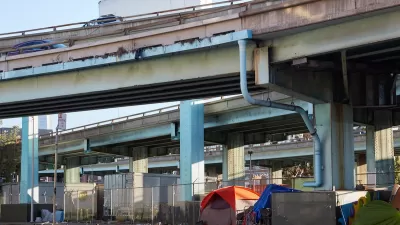The innovative housing program launched during the pandemic has made a significant difference for unhoused individuals, but long-term support remains underfunded.

Carolina Reid summarizes California’s Homekey Program: Unlocking Housing Opportunities for People Experiencing Homelessness, a report from Berkeley's Terner Center for Housing Innovation that assesses the successes and challenges of the innovative housing program. "Developed in the midst of the COVID-19 pandemic, Homekey provides local public entities with large, capital grants that can be used to purchase existing buildings and convert them into housing for people experiencing or at risk of homelessness."
According to the blog, "All told, Homekey 1.0 added 6,000 rooms and/or units to the state’s supply of interim and permanent housing in under six months, at an average initial cost of $238,000 per unit," less than half the average cost of building an affordable housing unit in California.
"We find that Homekey’s grant structure–coupled with giving jurisdictions flexibility in how to use the funds–allowed them to move quickly to respond to local needs." Additionally, "Homekey’s emphasis on speed—facilitated by regulatory streamlining—made all the difference in how quickly localities were able to get people housed."
Reid notes that "For all its strengths, Homekey remains embedded within an underfunded and fragmented affordable housing system. This means that many properties do not have sufficient funding to support long-term operations—this remains the single largest challenge and concern for Homekey grantees." According to the report, "The resources to support resident well-being—including case management, health care, and mental health and/or substance use counseling—also remain well below need."
Reid concludes that the rapid deployment of Homekey shows promise, but the state must continue to support the program with appropriate resources for long-term success.
FULL STORY: California’s Homekey Program: Unlocking Housing Opportunities for People Experiencing Homelessness

Planetizen Federal Action Tracker
A weekly monitor of how Trump’s orders and actions are impacting planners and planning in America.

San Francisco's School District Spent $105M To Build Affordable Housing for Teachers — And That's Just the Beginning
SFUSD joins a growing list of school districts using their land holdings to address housing affordability challenges faced by their own employees.

The Tiny, Adorable $7,000 Car Turning Japan Onto EVs
The single seat Mibot charges from a regular plug as quickly as an iPad, and is about half the price of an average EV.

Trump Approves Futuristic Automated Texas-Mexico Cargo Corridor
The project could remove tens of thousands of commercial trucks from roadways.

Austin's First Single Stair Apartment Building is Officially Underway
Eliminating the requirement for two staircases in multi-story residential buildings lets developers use smaller lots and more flexible designs to create denser housing.

Atlanta Bus System Redesign Will Nearly Triple Access
MARTA's Next Gen Bus Network will retool over 100 bus routes, expand frequent service.
Urban Design for Planners 1: Software Tools
This six-course series explores essential urban design concepts using open source software and equips planners with the tools they need to participate fully in the urban design process.
Planning for Universal Design
Learn the tools for implementing Universal Design in planning regulations.
Smith Gee Studio
City of Charlotte
City of Camden Redevelopment Agency
City of Astoria
Transportation Research & Education Center (TREC) at Portland State University
US High Speed Rail Association
City of Camden Redevelopment Agency
Municipality of Princeton (NJ)





























